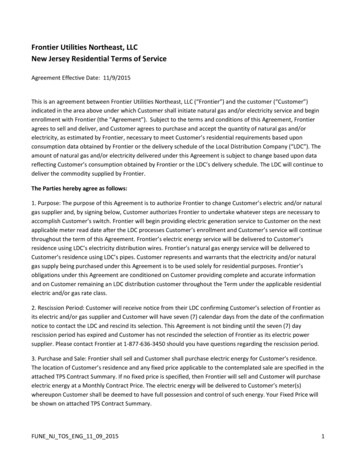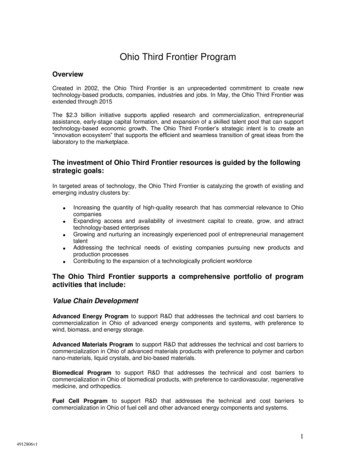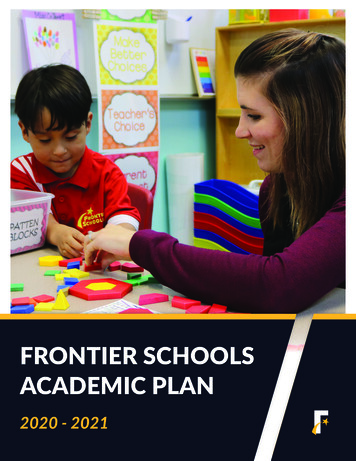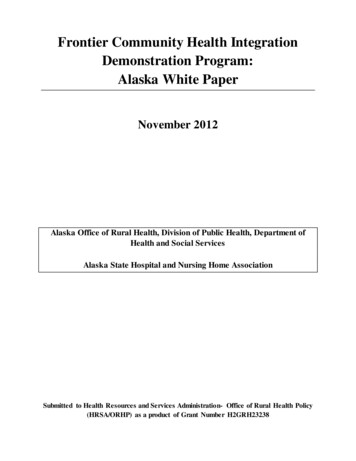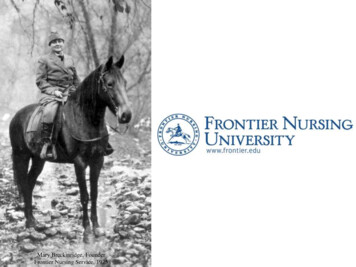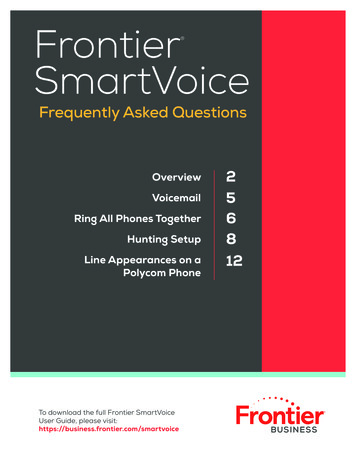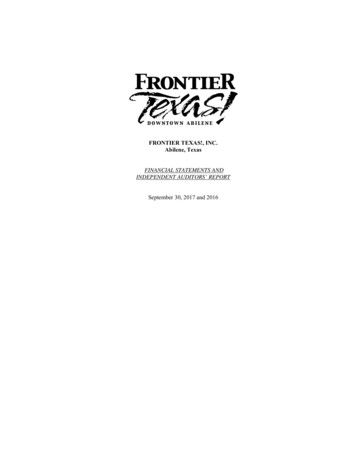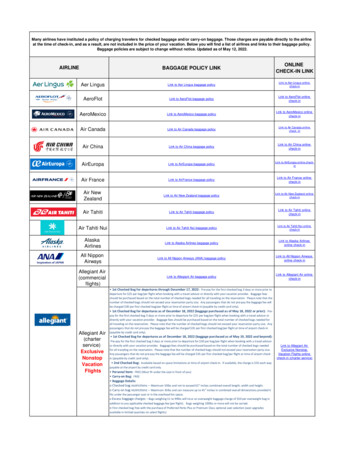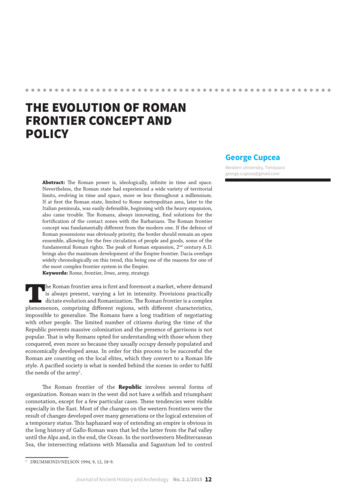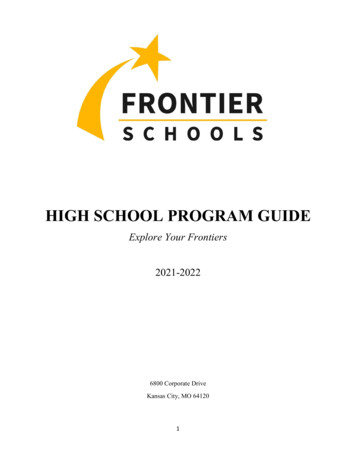
Transcription
HIGH SCHOOL PROGRAM GUIDEExplore Your Frontiers2021-20226800 Corporate DriveKansas City, MO 641201
FRONTIER SCHOOLS PHILOSOPHYVision StatementBe a vibrant and innovative educational leaderMission StatementEmpower students to discover and develop their gifts and talents in pursuit of college readiness, productive citizenship and lifelong learning within an atmosphere of academic excellence with a STEM (Science, Technology,Engineering and Math) focus to prepare for the jobs projected for American workforce meeting the needs of all, including those whose primary interest is non-STEM providing flexibility to expand in the future to a STEAM environment by adding anArts component2
Table of ContentsSection I: Frontier – College Ready5Rigorous Curriculum5College Geared Coursework5Progress Monitoring with Ongoing Assessment and Personalized Support5College and Career Counseling Support for Students5Student Expectations and Commitment5College Readiness Monitoring6Intervention for College Readiness8National Honor Society9Section II: General Information10Attendance10Minimum Course Load10Student Classification10How to Earn Credit10Recovering/Retaking a Course11Schedule Changes12Dropping a Class12Grading Scale, Class Ranking, GPA13Grade Calculation13Grading Scale and Course Weight13Senior Class Rank13Graduation Ceremony13Credits from Other Institutions14Transfer Students14Course-by-Credit Summary15Graduation Options for Students with Disabilities18Community Service18What is Community Service?193
Why is Community Service Important?19Community Service Guidelines19Acceptable Community Service Hours20Unacceptable Community Service Hours20Section IV: Advanced Placement (AP)21Enrollment Guidelines21Phase 1. Registering for an AP Class Flowchart21Phase 2. Completing Summer Assignment and Contract Flowchart22Students in AP Courses are expected to:22Section IV: Dual Credit Program24What is Dual Credit?24Why Dual Credit?25How Do Students Qualify for Dual Credit?25Dual Credit Plan and High School Course Equivalency25Frontier Schools Dual Credit Program Guidelines26Section VI: College Counseling27Process at Frontier Schools27CROSSWALK OF CAREER PATHS/CLUSTERS28Individual Student Planning Vocabulary29Missouri Connections30Individual Career and Academic Plan30Section VII: A Scholarship Program31Section VIII: Course Descriptions32FORMS & DOCUMENTS37Dual Credit Program Agreement37A Program Participation Agreement38Community Service Log394
Section I: Frontier – College ReadyAt Frontier, students are expected to master their subjects, and every Frontier student graduatescollege-ready and career ready. Our high school program is designed to provide each studentwith the essential elements of a college prep education, along with opportunities to engage in theexploration of intense study within particular fields of interest.Through the following components, every Frontier student will attain skills and abilities that arenecessary to be successful in college and beyond.Rigorous CurriculumFrontier offers rigorous and relevant coursework with a heavy emphasis on STEM courses.Middle and high school curriculum and programs are designed to prepare students for collegelevel courseworkCollege Geared CourseworkFrontier’s high school program is designed to ensure acceptance, enrollment, and success infour-year colleges/universities. Students are expected to successfully complete a minimum of 24credits in different subject areas identified by the state of Missouri.Progress Monitoring with Ongoing Assessment and Personalized SupportFrontier educators have necessary tools to monitor academic progress of each student and toadjust instructional strategies to better meet students’ needs. Based on ongoing assessment anddata analysis, personalized learning opportunities and individualized need-based support will beprovided to every student in order to achieve their college and career goals.College and Career Counseling Support for StudentsOur goal is to guide every Frontier student in preparing for and achieving his or herpostsecondary goals and aspirations. College counselors provide individualized support to eachstudent in the five areas of college and career readiness. Personal ReadinessAcademic ReadinessCareer ReadinessCollege AdmissionsFinancial Aid and ScholarshipsStudent Expectations and CommitmentAt Frontier, all students are expected to: Complete Frontier Schools Standard or Honors Graduation PlanComplete state-mandated end-of-course tests (EOC)Show proof of completion of at least 60 hours of community serviceReceive acceptance to a two or four year college or university5
College Readiness MonitoringFS implements End-of-Course (EOC), Northwest Evaluation Association (NWEA), PreACT,ACT, PSAT/NMSQT , PSAT 8/9, PSAT 10 assessments to track the academic readinessof students. Students who meet minimum expected scores for each grade level are on target to becollege ready. End-of-Course (EOC):The Missouri Assessment Program assesses students' progress toward the MissouriLearning Standards, which are Missouri's content standards. End-of-Course assessmentsare taken when a student has received instruction on the Missouri Learning Standards foran assessment, regardless of grade level. Missouri's suite of available End-of-Courseassessments includes: English I, English II, Algebra I, Algebra II, Geometry, AmericanHistory, Government, Biology and Physical Science. Districts must ensure that studentscompleted EOC assessments in Algebra I, English II, Biology, and Government prior tohigh school graduation. For students who complete the Algebra I EOC assessment priorto high school, Algebra II is the required high school mathematics assessment foraccountability purposes. All students, including Missouri Option students, are required toparticipate in EOC assessments designated as "required" for accountability purposes. Afew groups of students are exempt from EOC assessments required for accountabilitypurposes. Exempt student groups include:o Students whose IEP teams have determined that they are eligible to participate inthe Missouri Assessment Program-Alternate (MAP-A)o English Language Learners (ELL) who have been in the United States 12cumulative months or fewer at the time of administration may be exempted fromtaking the English II and/or English I assessments.o Foreign exchange students (not required to participate, but may do so at thedistrict's discretion)o Home schooled students (not required to participate, but may do so at the localdistrict's discretion) Northwest Evaluation Association (NWEA):Founded by educators nearly 40 years ago, Northwest Evaluation Association (NWEA ) is a global not-for-profit educational services organization known for ourflagship interim assessment, Measures of Academic Progress (MAP ). More than7,400 partners in U.S. schools, districts, education agencies, and international schoolstrust us to offer pre-kindergarten through grade 12 assessments that accurately measurestudent growth and learning needs, professional development that fosters educators’ability to accelerate student learning, and research that supports assessment validity anddata interpretation. American College Testing (ACT):The ACT is a standardized test that measures a student's skills in five core areas: English,math, reading, science, and writing (optional). Students in grades 11 and 12 take the ACTso that they can submit their scores to colleges as part of the college application process.6
Subject 0Composite215Writing(Optional)1 essayTime (inminutes)456035352 hours and55 minutesBetween 1-36Between 1-36Between 1-36Between 1-36Average of English, Math, Reading andScience. Between 1-3640Between 1-12Score RangeAll students in the 11th grade shall take the ACT as required by the district. In addition toACT, the district may also require students to take the SAT, ASVAB or Accuplacer tests. Scholastic Aptitude Test (SAT):The SAT is a standardized test widely used for college admissions in the United States. Itis an alternative for ACT.Subject AreaEvidenced BasedReading andWritingReadingWriting andLanguageMathMath-No CalculatorMath-CalculatorTotalWriting (Optional)Total QuestionsTime (in minutes)52654435203815425553 hours1 Essay50ScoreRange200-800200-800400-1600Reported in 3dimensions,each 2-8 Preliminary Scholastic Aptitude Test/National Merit Scholarship Qualifying Test(PSAT/NMSQT):Frontier Public Schools is dedicated to providing a comprehensive college preparatoryprogram that facilitates each student’s ambition to pursue higher education at the nation'stop universities and colleges. As a part of this process, students in 11th grade may takethe PSAT/NMSQT test in Fall. The most common reason for taking the PSAT/NMSQTis to receive feedback on student strengths and weaknesses so that students can focustheir preparation on those areas that could most benefit from additional study or practice.This test also gives students a chance to enter National Merit Scholarship Corporation(NMSC) scholarship programs.7
Subject AreaEvidenced BasedReading andWritingReadingWriting andLanguageMathMath-No CalculatorMath-CalculatorTotalTotal QuestionsTime (in minutes)47604435173113925452 hours and 45 minutesScoreRange160-760160-760320-1520 Preliminary Scholastic Aptitude Test 10 (PSAT 10):The PSAT 10 and PSAT/NMSQT are the same test, offered at different times of year.Students in 10th grade may take PSAT 10 in Spring. The scores of this test are not usedfor the National Merit Scholarship. Preliminary Scholastic Aptitude Test 8/9 (PSAT 8/9):The PSAT 8/9 is a test that is designed to help students and teachers figure out whatstudents need to work on most so that they’re ready for college when they graduate fromhigh school. It tests the same skills and knowledge as the SAT, PSAT/NMSQT, andPSAT 10—in a way that makes sense for their grade level.Subject AreaEvidenced BasedReading andWritingReadingWriting alScoreRangeTotal QuestionsTime (in minutes)425540301320120-72025120402 hours and 25 minutes240-1440120-720Intervention for College ReadinessFS intervention programs are designed at each grade level to ensure that students are on the collegereadiness track. FS has an ongoing benchmarking system to monitor the progress of each student.Then, assessment data is used to develop an individualized learning plan for each student.8
National Honor SocietyHigh school students who have maintained a minimum GPA of 3.0 during their high school careerare eligible for nomination to the school’s local chapter of the National Honor Society. Studentsseeking admission should contact the sponsor for admission guidelines. The student must havebeen enrolled in the current school for at least one semester. Selection for membership is basedupon a student’s evidence of scholarship, service, leadership, and character. Selection will be madeby a faculty council appointed by the Principal. Discipline referrals and excessive absences willconstitute evidence of deficiencies in character and leadership. Service contributions aredetermined by completion of a service form by the nominee and scored by the faculty council.Induction is held twice during each academic year.9
Section II: General InformationAttendanceAttendance Requirements to receive credits for courses:1. Students must attend school 90% of the time in order to be eligible to receive credits.2. The Attendance Review Committee will make the ultimate decision whether or not the studentreceives credit in a class.3. Dual Credit students must meet the attendance requirements set by the local campus.4. IEP and 504 committees may be considered as an attendance committee for students withdisabilities.Minimum Course Load9th, 10th and 11th grade students are required to enroll six classes at minimum per semester. 12thgrade students are required to enroll in eight classes (or equivalent) per semester.EXCEPTIONS:1. Senior students enrolled in off campus Dual Credit courses can take the last period off intheir high school schedules. College course schedule verification andcounselor/administrator approval is required.2. Senior students who are on track for their graduation credit requirements and areenrolled in Dual Credit and AP courses may be granted Independent Study classes.Counselor/administrator approval is required.Student ClassificationStudents will be classified in certain grade levels by the number of credits he or she has earned atthe end of each school year.Freshman (9th)0.00-4.50 creditsSophomore (10th)5.00-10.50 creditsJunior (11th)11.00-16.50 creditsthSenior (12 )17.00-24.00 creditsHow to Earn CreditCourses vary from one to two semesters in length. Students can earn a half credit for each semestercourse and a whole credit for a year-long course* (exceptions may apply). Students earn creditswhen they pass their courses with the minimum of 60% average and meet 90% attendancerequirement. Each semester stands alone. Semesters are not averaged together except in cases ofstudent progression plan.To earn one unit of credit, a student must meet all the course requirements and earn a passing grade10
in a course that meets for at least 7,830 minutes a year. Half-units of credit may be earned forcourses meeting proportionately fewer minutes.The following are ways a student can earn credit: A course is taken as a part of the student’s high school schedule A Dual Credit college course ‐ approved by counselor - is taken for high school credit andcollege credit (must be one of the approved courses listed on the dual credit list-- refer tothe Dual Credit programs, Section IV.) AP Exam Online courses ‐ approved courses through accredited online course providers Summer School OpportunitiesStudents and parents assume the responsibility for registering for, and completing coursesattempted. Students and parents assume the cost of taking courses outside of their regular highschool schedule.Students must talk to their counselor for information regarding alternate methods of acquiringcredits before signing up for any course.Recovering/Retaking a CourseStudents who receive a failing grade must recover the course in order to receive the requiredcredit. Below are the guidelines for credit recovery-The school may offer recovery courses during the summer school or academic year.The school administration identifies the criteria of recovery courses.Students can also take recovery courses online or at other schools with the approval ofschool administration.Both grades will appear on the transcripts.Only the most recent grade will be calculated in the overall grade point average.Occasionally, students may wish to retake a course to improve their knowledge and skills in thatsubject matter area.If they had previously earned the credit, the following guidelines will apply: No additional credit is earned when a course is repeated. Both grades will appear on the transcript. The most recent grade will be calculated in the GPA. The policy does not apply to courses that are intended to be repeated, such as: band,11
newspaper, weight training, etc. 90% attendance is required. Administrative approval is required.NOTE: Students may wish to retake a dual credit course to improve a failing or low grade. Inthis case, the fees (tuition, textbook, other materials) for the previous class must be fully paidback to school. Only the second (the most recent) grade will affect the GPA. Both grades willappear on the transcript.Schedule ChangesStudents must choose their courses carefully and with the advice of their counselor and parents tominimize the need for a change. The master schedule is built to accommodate the classes originallychosen by the student.Schedule changes based on teacher, elective, or section preferences may not be honored. Theadministration reserves the right and has the responsibility to only make changes as necessary tomeet graduation requirements, balance class sizes, correct administrative or clerical error, reflectchanges in school personnel, or other educationally appropriate reasons.Dropping a Class Changes requested after the Course Plan has been submitted will be made only for thefollowing reasons per counselor approval:o A Senior needs to make up deficient graduation creditso A student received a failing grade and needs to repeat the class for high schoolgraduation requirements or to meet college eligibility requirementso A student is in the incorrect course levelo A course requested will not be offered due to budgetary restraints or low class sizeo A student completed a course credit at summer school During the first 10 school days of class, students may request a schedule change accordingto the following guidelines:o Level changes can be requested by students and parents based on availability(grades from the dropped upper level course will be carried into the added lowerlevel course)o Placement recommendation based on academic performanceo Medical/health issues require adjustment in scheduleo Course needed for graduation or college eligibility requirements12
Grading Scale, Class Ranking, GPAGrade CalculationA student’s Grade Point Average (GPA) is calculated by dividing the total amount of grade pointsearned by the total amount of credit hours attempted. All semester grades for courses attemptedwill count toward a student’s GPA. Weighted GPA is used to determine class rank. UnweightedGPA is used for admission to most colleges and universities, and for scholarships at in‐stateschools.Grading Scale and Course WeightA student’s Grade Point Average (GPA) is calculated by dividing the total amount of grade pointsearned by the total amount of credit hours attempted. All semester grades for courses attemptedwill count toward a student’s GPA.Letter GradeGrade RangeAP/DUAL/PLTWOn-Level CourseA90-100 0.0Senior Class RankFrontier schools are ranking schools. A class rank indicates how a student's grades compare withthose of other students in his/her class.Class rank is determined by the weighted grade point average (GPA) of all high school creditcourses taken through the end of the eighth semester. Rank for graduation status(valedictorian/salutatorian) is determined by the final overall high school GPA at the end of theeighth semester.To be eligible for senior class ranking (valedictorian and salutatorian) students must be enrolledfor their junior and senior years in the same high school, and graduate in no fewer than eightregular semesters.Graduation CeremonyStudents completing the Frontier Schools and State of Missouri requirements for graduation will13
be granted a high school diploma. FS annually sponsors a graduation ceremony for students whohave completed requirements established by both the FS and the State. Students who have notcompleted requirements may participate in the graduation ceremony with an approval from theprincipal. Even if the student participates in graduation ceremony, he or she may remain enrolledto complete the FS requirements and earn his and her high school diploma; however, the studentwill only be allowed to participate in graduation ceremony. Ordering graduation cap and gown,announcements, or other senior memorabilia does not guarantee a student’s participation ingraduation ceremonies. Graduation announcements are not invitations to the graduation ceremony.If a student does not attend and does not participate in the graduation ceremony practice/rehearsal,the student is ineligible to participate in the FS Graduation ceremony.Credits from Other InstitutionsCredits earned during the summer following the junior year will be entered to the junior year courselists and be counted in the overall GPA and ranking computations. Any credits received afterSeptember 1st will be entered to the senior course list and will not affect the ranking submitted tocolleges during the fall semester of the senior year. It is students’ responsibility to ensure summercredits are submitted on time and properly entered to their course lists.Transfer StudentsA student transferring into the district from a DESE accredited school will receive the numericalgrade earned in courses from that school. Weighted courses will be honored and converted tomatch our system.Students Transferring from schools outside of the United States: Students from other countrieswill receive Ps for passing appropriate courses. Translation of out-of-country transcripts is theresponsibility of the parent/guardian. Awarding of credit will be determined by schooladministration after review of all documentation.Students from Home Schooling Programs and unaccredited private schools: credits earnedthrough home schooling programs and unaccredited private schools will not be calculated forGPA and class rank by the district. Students must provide documentation of enrollment andcompletion of courses in order to get credit. Students will receive Ps for passing appropriatecourses.14
Section III: High School GraduationRequirementsIn order for a student to graduate from Frontier Schools, the student must fulfill:1.2.3.4.FS high school credit requirementAdmission by a 2-year/4-year collegeMinimum 60 community service hours1Complete state-mandated end-of-course tests (EOC)Course-by-Credit SummaryFrontier Schools High School Program is designed to ensure acceptance, enrollment, and success in 4year universities, and requires the following course‐by‐credit plan for all students, regardless of the planthey choose to graduate. Exceptions may apply to students receiving Special Education services.CourseCommunication ArtsMathematicsScienceSocial StudiesPersonal FinancePhysical EducationLanguages other than EnglishFine ArtsHealthPractical ArtsElectivesTOTALFrontier Schools StandardDiplomaFrontier Schools 4.00261 Community service requirement is 15 hours per year.2 May be waived for students in special programs, transfer students with no LOTE credit, etc. “Frontier SchoolsMinimum Standard Diploma” will be awarded to these students.15
Required Academic Program for FS High School l StudiesPersonal FinancePhysical EducationFrontier Schools Standard DiplomaFrontier Schools Honors DiplomaFour credits must consist of: English I English II English III/ AP English Language andComposition/Dual Credit English IV/AP English Literature andComposition/Dual CreditFour credits must consist of: Algebra I Geometry Algebra II An additional course for which Algebra II isprerequisite such as Pre-Calculus, AppliedMath, College Algebra, AP Calculus AB orAP Calculus BCFour credits must consist of: English I English II English III/ AP English Language andComposition/Dual Credit English IV/AP English Literature andComposition/Dual CreditFour credits must consist of: Algebra I Geometry Algebra II An additional course for which Algebra IIis prerequisite such as Pre-Calculus,Applied Math, College Algebra, APCalculus AB or AP Calculus BCThree credits from the following: Physical Science Biology or AP Biology Chemistry or AP Chemistry Physics or AP Physics (B or C) Dual Credit Science CoursesFour credits from the following: Physical Science Biology or AP Biology Chemistry or AP Chemistry Physics or AP Physics (B or C) Dual Credit Science CoursesThree credits from the following: American History or AP American History American Government or AP USGovernment World History, World Geography, AfricanAmerican History Dual Credit Social Studies CoursesThree credits from the following: American History or AP AmericanHistory American Government or AP USGovernment World History, World Geography,African American History, WorldReligions, Contemporary History,Contemporary Issues Dual Credit Social Studies CoursesOne-half credit: Personal FinanceOne-half credit: Personal FinanceOne credit must consist of: Physical EducationOne credit must consist of: Physical Education16
Two credits must consist of any two levels inthe same language. An AP course can also besubstituted for each level (must also be thesame language).Three credits must consist of any threelevels in the same language. An AP coursecan also be substituted for each level (mustalso be the same language).One credit from the followings: Art MusicOne credit from the followings: Art MusicOne-half credit: HealthOne-half credit: HealthOne credit from the followings: Computer Applications Graphic Arts/Desktop PublishingOne credit from the followings: Computer Applications Graphic Arts/Desktop PublishingSeven credits from: Dual Credit Courses AP Courses PLTW Courses Critical Writing Journalism Debate Psychology Sociology World Religions African American History Earth Science Environmental Science Contemporary Issues Contemporary History Or any other course approved by FrontierSchool SystemFour credits from: Dual Credit Courses AP Courses PLTW Courses Critical Writing Journalism Debate Psychology Sociology World Religions African American History Earth Science Environmental Science Contemporary Issues Contemporary History Or any other course approved by FrontierSchool SystemGPACommunity ServiceNone3.0 or higher60 hoursACT/SATNone60 hoursACT Score 22 or aboveSAT Score 1100 or aboveLanguages Other ThanEnglishFine ArtsHealthPractical ArtsElective CoursesCollege/Institution ofHigher LearningAdmissionState TestingProof of acceptance to a two or four yearcollege.Proof of acceptance to a four year college.All students must complete the required state mandated tests for the graduation.17
PathwaysEngineering andTechnology PLTWIntroductiontoEngineeringDesign (IED)PLTWPrinciples ofEngineering(POE)Health Science PLTWPrinciples ofBiomedicalScience(PBS)PLTWHuman BodySystems(HBS)PLTW CivilEngineeringandArchitecture PLTWEngineeringDesign andDevelopment(EDDPLTWMedicalInterventions(MI) PLTWBiomedicalInnovation(BI)Visual Arts Art I Art II GraphicDesign Photography& YearbookDigitalCommunication hnology Web Design Introductionto ComputerScience inPythonJournalism &Broadcasting MobileApplicationsPhotography& Yearbook Game DesignSocial Science ContemporarySocial Issues Sociology Psychology CriminalJusticeGraduation Options for Students with DisabilitiesStudents with disabilities are provided an individualized educational program with variousopportunities to succeed. Annual meetings are held with students with disabilities and their parentsin which an Individualized Educational Plan (IEP) is developed and an appropriate educationalplan is determined. Students receiving special education services follow the curriculum and creditrequirements required of all students as determined by their prospective graduation plan. Studentswith identified special needs will be provided appropriate accommodations in regular classes.Should students need modification of the state standards, they may be served in specialized classesaccording to their Individual Education Plan (IEP).Community ServiceStudents are required to accumulate a total of 60 service hours throughout high school tograduate.18
What is Community Service?Community service is a voluntary activity that helps address a shortage of some sort in thecommunity. The community service you select should be aligned with your personal interest andskills. It is an opportunity to gain experience on the way to college readiness and exemplarycitizenship.Why is Community Service Important?Giving back to your community while engaging in an activity you truly are interested in doing isa win-win. Serving your community will address the persisting needs and problems thus helpingyour community become stronger as a function of it. Community service hours provide a uniqueopportunity to build social, leadership, and problem solving skills. These skills are essential infinding a job. Finally, you get an opportunity to apply your knowledge in real life. Don’t forget,colleges also pay attention during college application.Community Service Guidelines Regularity of service is recommended than irregular patches of hours here and there as itshows your commitment. Students cannot get paid for the work, nor can they fill a position that would normally bea paid position. Service MAY NOT be performed for family members or for profit making organizations. Community service must be completed at a non-profit organization; therefore studentsshould ask the organization or business if they are non-profit prior to performingactivities. The term “non-profit” does not relate to whether or not the student is paid forthe activities performed. As a general rule, activities performed at places like libraries,schools, Meals on Wheels, hospices, Habitat for Humanity and faith-based organizationsare acceptable. Please keep in mind that hair salons, barber shops, martial arts studios,doctors’ offices and physical therapy facilities are FOR PROFIT businesses and thereforeunacceptable, even if you volunteer to help in them. It is the responsibility of the studentto make sure that the hours are properly logged in by the organization. Membership in a service club or organization does not constitute service. However, if theclub performs service activities in the community or school beyond club meeting times,this can be counted as service. Service may NOT be performed during the school day except during a student’s lunchperiod. Service must be performed during the students’ own time (before/after schooland/or weekends). Activities performed at faith-based organizations such as churches, synagogues ormosques will be counted towards the community service requirement as long as theactivities are NOT religious in nature. For example, acti
Section I: Frontier - College Ready At Frontier, students are expected to master their subjects, and every Frontier student graduates college-ready and career ready. Our high school program is designed to provide each student with the essential elements of a college prep education, along with opportunities to engage in the
